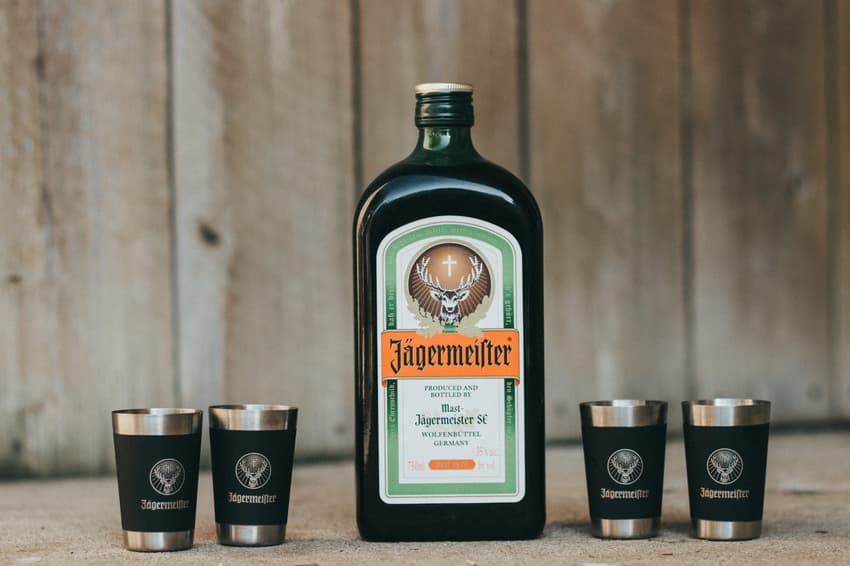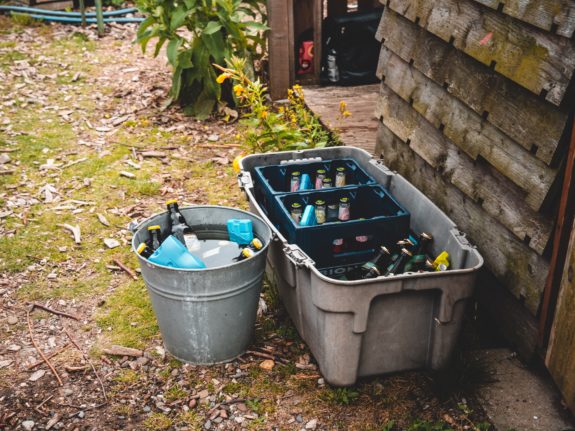10 ways to talk about being drunk in German

Austria is famous for its love of beer, schnapps and wine. So here are some phrases to help you express various levels of inebriation in the German language.
1. Betrunken sein
The most straightforward way to express alcohol-induced intoxication in German, which will leave no one in any doubt as to your state, is to use the word betrunken meaning "drunk".
Example:
Es ist ihm egal - er ist betrunken!
He doesn't care - he's drunk!
2. Saufen
Next up is the most common word for “boozing” in German. Saufen can be used both as a verb and a noun to mean "to get drunk" or "drinking".
Examples:
Lass uns einfach weiter saufen!
Let's just keep drinking!
Ich habe kein Problem mit dem Saufen
I don't have a drinking problem.
3. Alkoholisiert sein
This is more of a formal way to talk about being drunk, and is equivalent to the English “to be under the influence of alcohol”. You’ll usually hear authorities and newspaper reports using this phrase to talk about alcohol-related incidents.
Examples:
Der Fahrer war alkoholisiert
The driver was under the influence of alcohol
Es ist aus Sicherheitsgründen untersagt, vor Spielbeginn alkoholisiert anzukommen.
For safety reasons, it is prohibited to arrive intoxicated before the start of the game.
4. Blau sein
This expression, meaning literally “to be blue” has a pretty disgusting origin story.
In the middle ages, the plant woad was used to create a blue colour for dyes.
As only a small amount of alcohol was needed to speed up the dyeing process, using human urine containing alcohol was supposedly the cheapest way to ferment the dye.
READ ALSO: Hugo, Almdudler and Radler: 5 drinks to try in Austria
So the dyers drank beer all day and urinated into the vat where the plant was fermenting. Remember that next time you wear your favourite blue t-shirt.
Example:
Er war so blau, dass er seinen Schlüssel nicht in die Tür bekam
He was so drunk that he couldn't get his key in the door
5. Beschwipst sein
The phrase beschwipst sein is equivalent to the English “to be tipsy” and not yet in the full throws of drunkenness.
READ ALSO: Austrian old folks toast success of ‘Grandma and Grandpa’ beer
The word was first used in Austria in the 19th century and can be traced back to the verb schwippen, meaning to sway, as it describes a drunk person who finds it increasingly difficult to walk in a straight line.
Example:
Ich bin nicht betrunken, nur ein bisschen beschwipst
I'm not drunk - just a little tipsy
6. Zu tief ins Glas schauen
This idiom is most likely a jokey rethink of the idiom tief ins Augen schauen meaning "to look someone too deeply in the eyes" as a way of saying "to fall in love with someone".
This phrase for drunkenness has been in use in the German language since around 1700 and has even made appearances in many literary works, including those of Goethe.
Examples:
Du solltest nicht zu tief ins Glas schauen, sonst musst du dir ein Taxi nehmen
You'd better not get too drunk, or you'll have to take a taxi
Immer mehr Rentner schauen oft zu tief ins Glas
More and more pensioners get drunk often
7. voll wie ein Eimer sein
This expression, meaning "to be as full as a bucket" is just one of a multitude of German expressions that include the word voll ("full") to express drunkenness.
 Beer buckets (Photo by Jonathan Kemper on Unsplash)
Beer buckets (Photo by Jonathan Kemper on Unsplash)
There are numerous phrases that start with voll wie ("as drunk as") and end in something heavy, such as Granate (grenade), Schwein (pig), Kanone (canon), and even voll wie ein tausend Russen ("full as a thousand Russians"). Why not try making up your own variation?
8. Einen im Tee haben
This idiom, which is not that common in Austria, is believed to have originated in northern Germany, where a drop of rum was often added to tea on cold winter days for a warm comforting feeling and to protect against the cold - especially by sailors. After one or two, of course, you would be drunk, or at least a little tipsy.
Example:
Er hatte ganz schön einen im Tee
He’s pretty wasted
9. einen sitzen haben
This phrase is a shortened version of the older einen Affen sitzen haben meaning "to have a monkey sitting" which was used to express a heightened state of inebriation.
READ ALSO: Tips: How to buy wine in an Austrian supermarket
The origin of the phrase is disputed, but most believe it is to do with the fact that fools and jesters would often carry a monkey on their shoulder.
Example:
Ich hatte gestern so richtig einen sitzen
I was so drunk yesterday
10. Kater
Although Kater is also the name for a male cat, this is the German term for "hangover" that you will inevitably need to use after consuming too much alcohol.
It's widely believed that the origin of this word comes from the medical term "Katarrh", an inflammation of the mucous membrane, which leads to symptoms such as cough, cold, malaise and headache - similar to those of a hangover.
 Photo by Erik Mclean on Unsplash
Photo by Erik Mclean on Unsplash
Example:
Ich hatte am Sonntag einen schrecklichen Kater
I had such a terrible hangover on Sunday
Comments
See Also
1. Betrunken sein
The most straightforward way to express alcohol-induced intoxication in German, which will leave no one in any doubt as to your state, is to use the word betrunken meaning "drunk".
Example:
Es ist ihm egal - er ist betrunken!
He doesn't care - he's drunk!
2. Saufen
Next up is the most common word for “boozing” in German. Saufen can be used both as a verb and a noun to mean "to get drunk" or "drinking".
Examples:
Lass uns einfach weiter saufen!
Let's just keep drinking!
Ich habe kein Problem mit dem Saufen
I don't have a drinking problem.
3. Alkoholisiert sein
This is more of a formal way to talk about being drunk, and is equivalent to the English “to be under the influence of alcohol”. You’ll usually hear authorities and newspaper reports using this phrase to talk about alcohol-related incidents.
Examples:
Der Fahrer war alkoholisiert
The driver was under the influence of alcohol
Es ist aus Sicherheitsgründen untersagt, vor Spielbeginn alkoholisiert anzukommen.
For safety reasons, it is prohibited to arrive intoxicated before the start of the game.
4. Blau sein
This expression, meaning literally “to be blue” has a pretty disgusting origin story.
In the middle ages, the plant woad was used to create a blue colour for dyes.
As only a small amount of alcohol was needed to speed up the dyeing process, using human urine containing alcohol was supposedly the cheapest way to ferment the dye.
READ ALSO: Hugo, Almdudler and Radler: 5 drinks to try in Austria
So the dyers drank beer all day and urinated into the vat where the plant was fermenting. Remember that next time you wear your favourite blue t-shirt.
Example:
Er war so blau, dass er seinen Schlüssel nicht in die Tür bekam
He was so drunk that he couldn't get his key in the door
5. Beschwipst sein
The phrase beschwipst sein is equivalent to the English “to be tipsy” and not yet in the full throws of drunkenness.
READ ALSO: Austrian old folks toast success of ‘Grandma and Grandpa’ beer
The word was first used in Austria in the 19th century and can be traced back to the verb schwippen, meaning to sway, as it describes a drunk person who finds it increasingly difficult to walk in a straight line.
Example:
Ich bin nicht betrunken, nur ein bisschen beschwipst
I'm not drunk - just a little tipsy
6. Zu tief ins Glas schauen
This idiom is most likely a jokey rethink of the idiom tief ins Augen schauen meaning "to look someone too deeply in the eyes" as a way of saying "to fall in love with someone".
This phrase for drunkenness has been in use in the German language since around 1700 and has even made appearances in many literary works, including those of Goethe.
Examples:
Du solltest nicht zu tief ins Glas schauen, sonst musst du dir ein Taxi nehmen
You'd better not get too drunk, or you'll have to take a taxi
Immer mehr Rentner schauen oft zu tief ins Glas
More and more pensioners get drunk often
7. voll wie ein Eimer sein
This expression, meaning "to be as full as a bucket" is just one of a multitude of German expressions that include the word voll ("full") to express drunkenness.

There are numerous phrases that start with voll wie ("as drunk as") and end in something heavy, such as Granate (grenade), Schwein (pig), Kanone (canon), and even voll wie ein tausend Russen ("full as a thousand Russians"). Why not try making up your own variation?
8. Einen im Tee haben
This idiom, which is not that common in Austria, is believed to have originated in northern Germany, where a drop of rum was often added to tea on cold winter days for a warm comforting feeling and to protect against the cold - especially by sailors. After one or two, of course, you would be drunk, or at least a little tipsy.
Example:
Er hatte ganz schön einen im Tee
He’s pretty wasted
9. einen sitzen haben
This phrase is a shortened version of the older einen Affen sitzen haben meaning "to have a monkey sitting" which was used to express a heightened state of inebriation.
READ ALSO: Tips: How to buy wine in an Austrian supermarket
The origin of the phrase is disputed, but most believe it is to do with the fact that fools and jesters would often carry a monkey on their shoulder.
Example:
Ich hatte gestern so richtig einen sitzen
I was so drunk yesterday
10. Kater
Although Kater is also the name for a male cat, this is the German term for "hangover" that you will inevitably need to use after consuming too much alcohol.
It's widely believed that the origin of this word comes from the medical term "Katarrh", an inflammation of the mucous membrane, which leads to symptoms such as cough, cold, malaise and headache - similar to those of a hangover.

Example:
Ich hatte am Sonntag einen schrecklichen Kater
I had such a terrible hangover on Sunday
Join the conversation in our comments section below. Share your own views and experience and if you have a question or suggestion for our journalists then email us at [email protected].
Please keep comments civil, constructive and on topic – and make sure to read our terms of use before getting involved.
Please log in here to leave a comment.